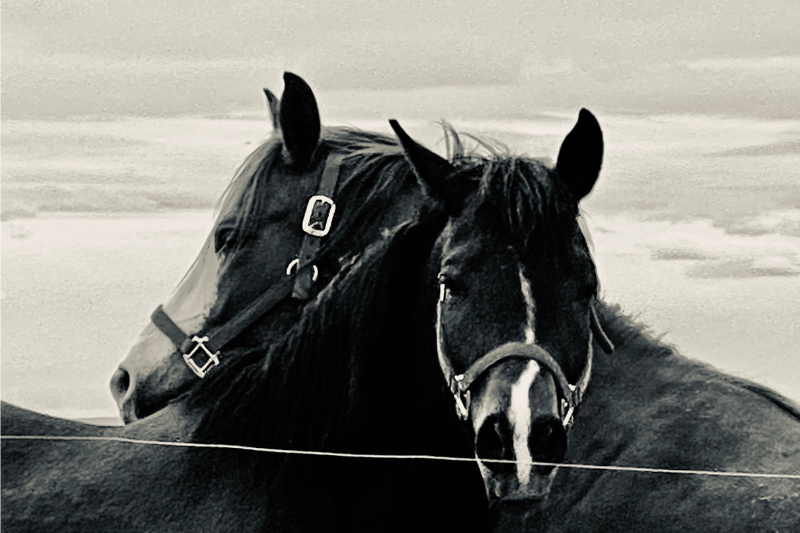My first job was at a small, shabby horse farm in the valley below my childhood home.
The driveway peeled off from a curvy, gravel road lined with hotwire paddocks, all nibbled bare and dotted with broodmares. The barn was creaky and drafty, with packed dirt aisles and a radio tuned to the country station. It smelled of shavings and Coppertox, of wool coolers and the manure pile out back.
I remember the horses: Each dished face with black globes for eyes. Each name and star and sock and personality. Even the patterns they left in the stalls I cleaned day over day for a couple years between the ages of twelve and fourteen.
I can still sing along about you and me goin’ fishin’ in the dark. I remember the mare that colicked and made me put my foot down with my mom for the first time, because I really could not leave her to go to my piano lesson, $60 paid in advance or not.
Most of all, I remember the farm’s owner. She was short and craggy, with cropped hair dyed black and heavy makeup that sharpened her narrow eyes nearly as much as the suspicion that always lay behind them. I rarely saw her without scarlet lips. The lips almost never smiled.
Her name was not Mae, but let’s pretend.
Mae had a jovial husband, round in the belly and sad behind his grin. I saw him only occasionally, but he was always kind to me. I marveled to see him with Mae, because the pair of them were so different. He gentle and she harsh, he easygoing and she tense. Terse. Poised like a wire stretched too tight, clinging white-knuckled to her tough persona. I wondered, even then, if it was all she had.
She loved her horses in the way hurting people do. In the way that says: You alone will not betray me. You are not my daughter who moved out young and never calls. You are not the old husbands who cheated, the farmhouse falling down around my ears, the abusive parents, the slander that cost me a career, the drunk driver who jabbed this endless pain into my spine.
I am guessing.
Mae never told me her story. Not in words. But I worked for her long enough, well enough, that she sometimes let her armor slip aside. Beneath cowered a woman who wore Paloma Picasso and gave me a tiny bottle for Christmas. Who sold me a colt for less than he was worth, taught me to build his hindquarters and stand him up, paid for an overnight trip to Washington where he won Reserve Champion at the big Arabian show.
She gave me tea in her cluttered living room on rainy days, rasped in her smoker’s voice over the soap operas that were the anthem of her afternoons. She said little of substance, but the things she did not say told me her rocky exterior was only a dam of anger holding back a lifetime of tears.
I think of her in the hard times. How quick she was to wrath, how limited her capacity for joy. Her path, whatever came before, had left her all but devoid of any ability to trust. I think that’s why she liked me, and perhaps her husband, too. Our loyalty was simple. Consistent. It surprised her. It was the only thing that reminded her to smile.
The thing about hard times is that they end. Worst case scenario, they end because we’ve died. Best case, either we or events around us shift and the trail widens and we carry on.
This is when we make our decisions:
What will we carry with us? The pain, or the healing? The betrayal, or the wisdom? The longing, or the truth
Will we come away with greater confidence than before, and with gratitude, because we have learned how strong we are? Or will we be cut off, shut down, stolen away?
I saw Mae cry once. Several years after I stopped working for her, I dropped by the farm to deliver a framed pencil drawing of the stallion Ben Bask. It was one of my better pieces. I have no idea why I wanted to give it to her, except that I thought she deserved to be remembered. To be thanked for teaching me ~ without knowing, through bad example ~ how I do not want to be.
She is probably dead now. Resentment like hers destroys body and soul before their time. But I am not afraid to hope (because that I what I do) that before the end she found another way, and didn’t let the winter take her after all.
[Originally published in The Barb Wire, March 2013]




I just found your article. It really hit a part of my soul. These are the memories I have growing up in a rural area west of Indianapolis 50 years ago. The names were different, but the genuine nature of people is the same. Mr Tweedy, Mrs Worth, the lady who owned the Trading Post and how can I forget the man my dad referred to as Mr. Hainey. The dirt roads we rode on for hours every day, picking up other riders we had never met along the way. Those are amazing, lifetime memories.
Thank you Tamara for reminding me.
So many old memories! Now you have me thinking back in return. 🙂